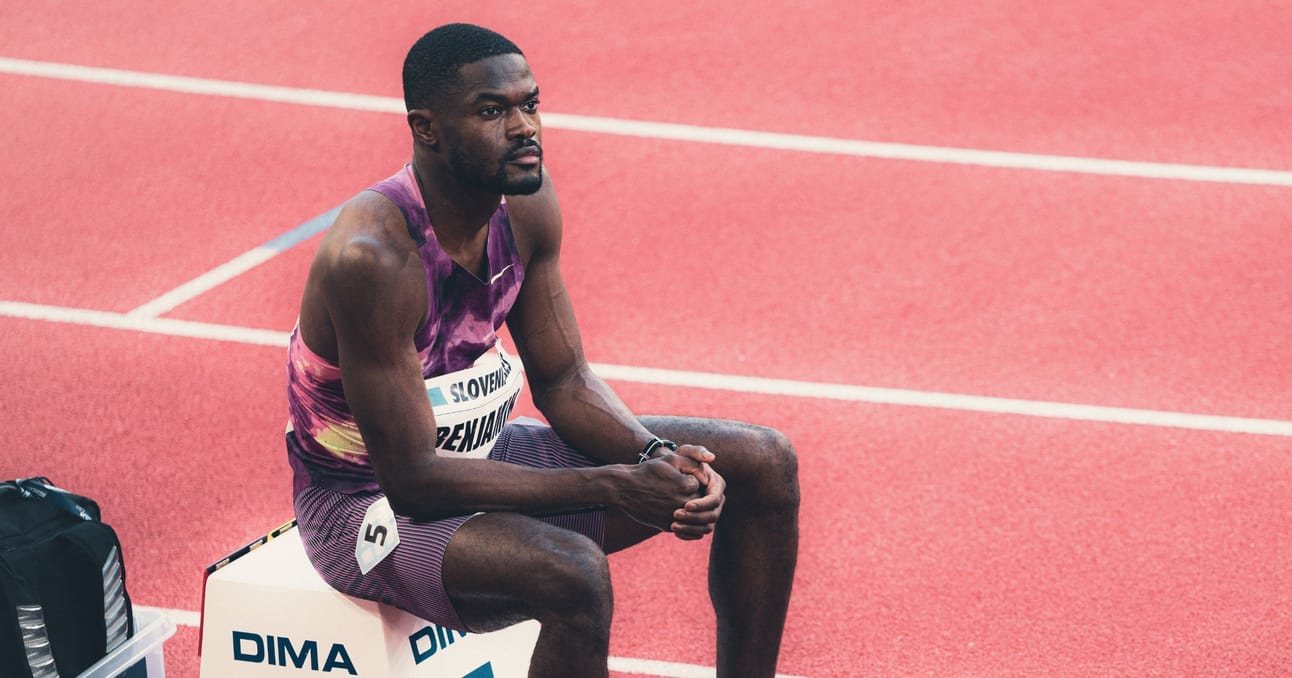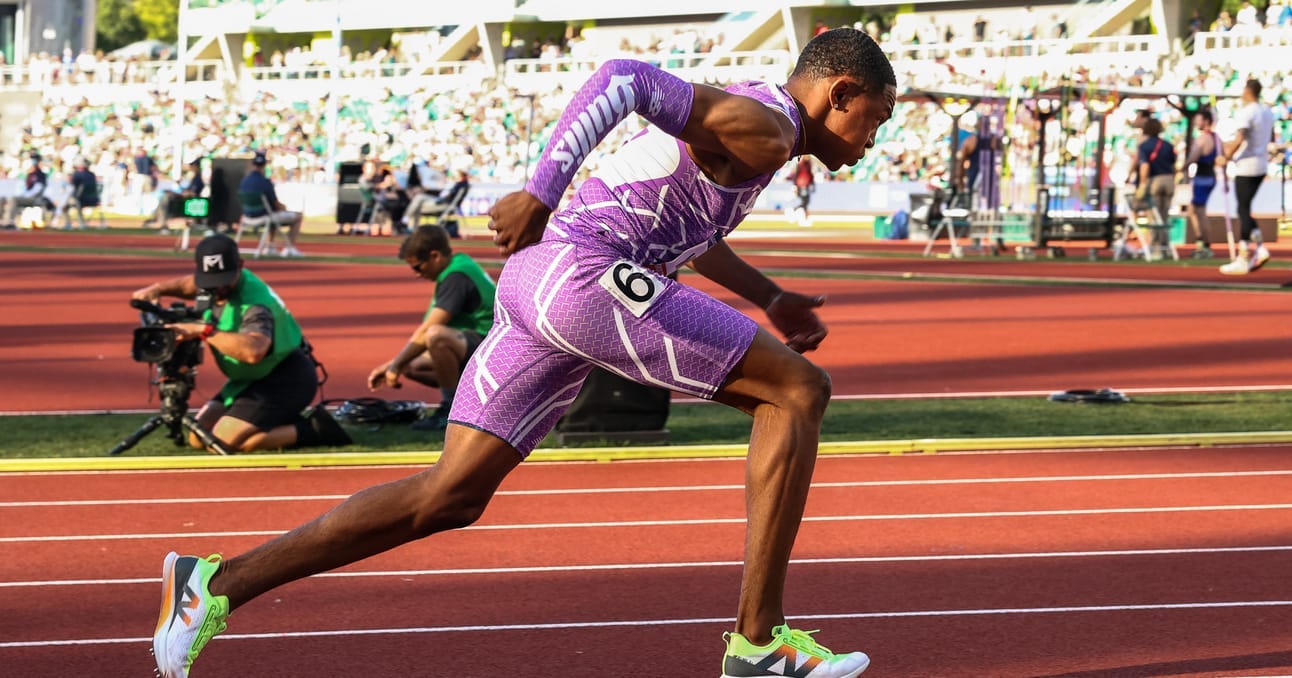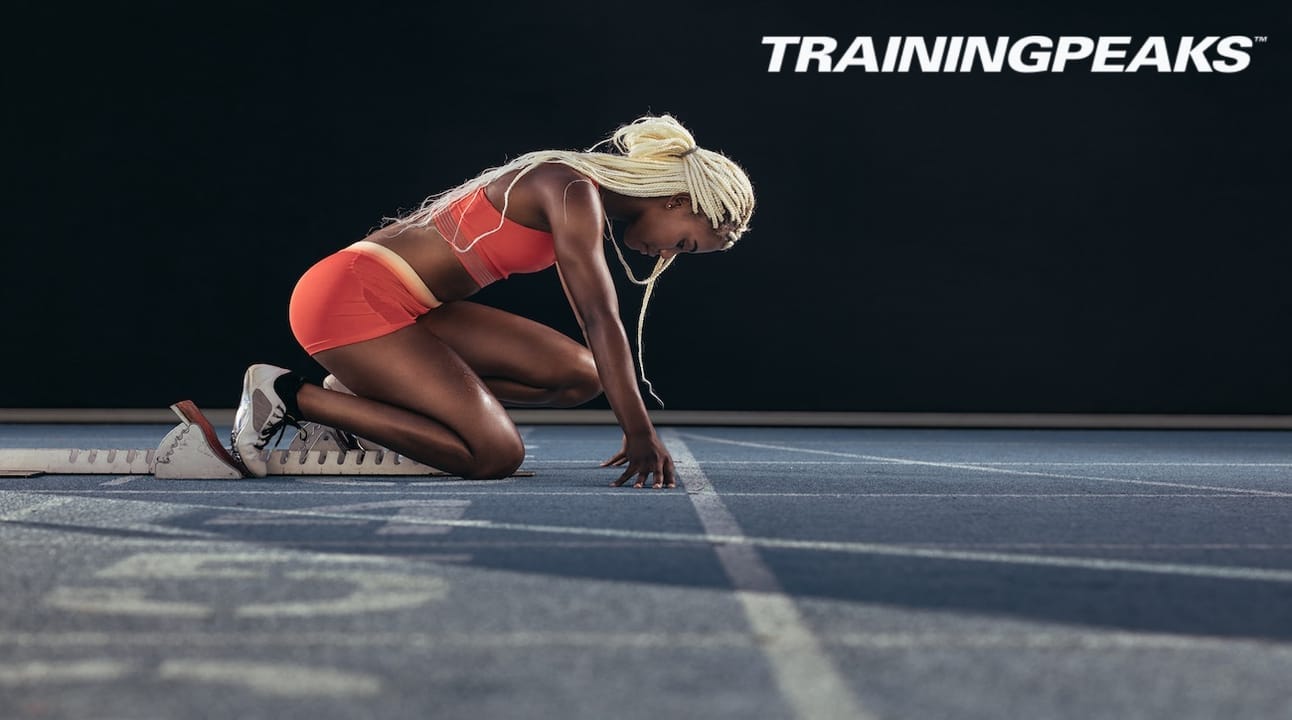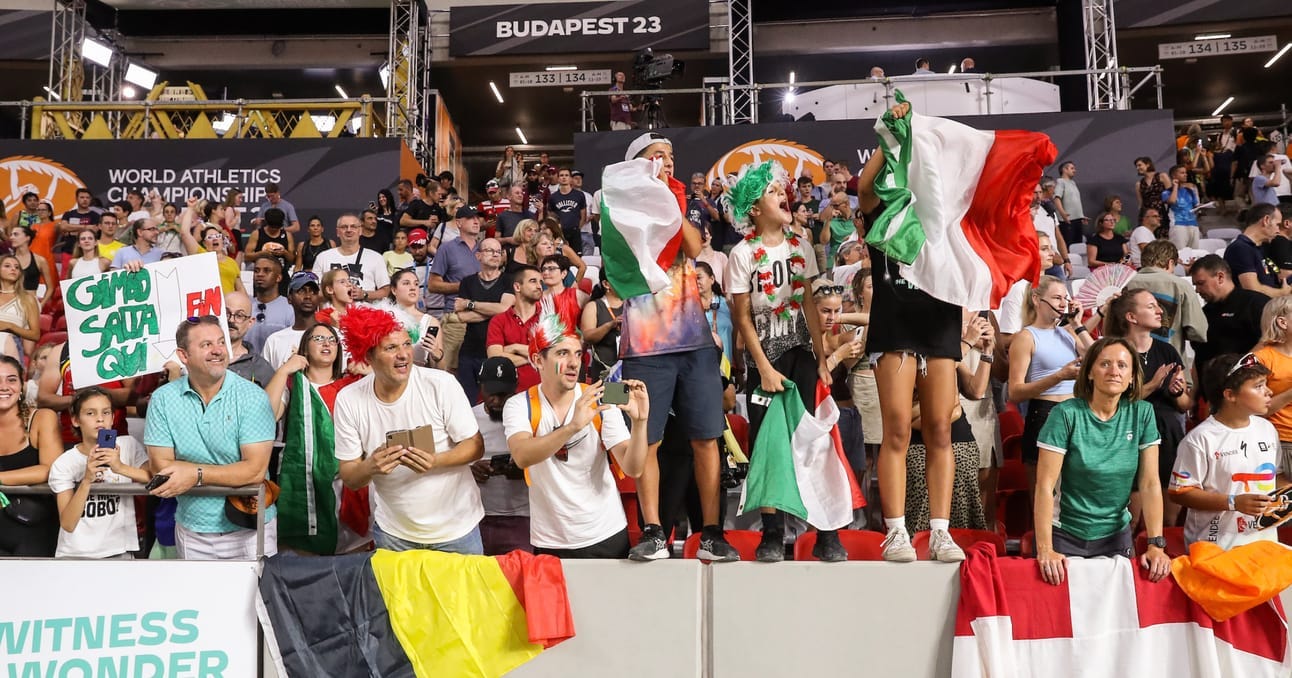Mid-Summer Vibe Check ⏱️
Lap 177: Sponsored by PUMA
Ready to break your PB? Meet the Deviate NITRO™ Elite 3, PUMA’s lightest raceday shoe ever designed for those who want to stand out. Packed with PUMA’s innovative NITROFOAM™ Elite for superior energy return and a stiffer carbon fiber PWR Plate for maximum speed, this shoe is all about race day performance. The breathable mono-mesh upper, reinforced with PWR Tape, pairs perfectly with PUMAGRIP that ensures unbeatable multi-surface traction. The Deviate NITRO™ Elite 3 is available now for purchase Learn more and shop here.
Compiled by Chris Chavez, Mac Fleet, David Melly, and Paul Snyder
Rethinking Paris Medal Contenders After The Monaco Diamond League 🇲🇨

Jessica Hull’s medal chances have only grown after her 3:50.83 1500m at the Paris Diamond League and 5:19.70 2000m WR at the Monaco Diamond League. (Photo by Jacob Gower / @jacob_gower_)
It’s easy to let the comedown from Olympic Trials around the world and the anticipation of those Paris entry lists lull you into a false sense of security that the Olympic table was fully set the second the last fan left Hayward Field. But with the Diamond League plowing ahead at full steam and athletes flexing their “I actually have started speedwork” fitness, there’s plenty of action to fuel speculation and keep the guys who set DraftKings odds busy.
The Herculis meet in Monaco featured plenty of big names (and a few notable absences), and some results were surprising. Others, not so much. Here’s a quick rundown of who’s really turning heads and who’s just telling us what we already knew:
The Big Three do battle: The late entry of Rai Benjamin meant that the three fastest 400m hurdles in history (Benjamin, Karsten Warholm, and Alison dos Santos) kicked off the meet by racing head-to-head-to-head. This time, it was Benjamin – the only athlete of the trio without a World/Olympic gold – who came out on top, building on his world-leading 46.46 in Eugene with a 46.67 and 0.07-second margin of victory over Warholm in Monaco. Does this make Benjamin the favorite for gold? Well, if you ask our New York-based contributors, the Mount Vernon native is their favorite (but the people of Oslo might feel differently). It certainly tipped the scales a bit in Benjamin’s favor, however, as he’s now beaten the winners of the last five global titles in one race.
Noah Lyles withdraws from Monaco: How do the good people of fancypants city-state Monaco feel about Yu-Gi-Oh Cards? We’ll have to wait another year to see, as Noah Lyles was a late scratch from last week’s Diamond League meeting, citing a desire to get in one more solid week of training at his Florida home base. Sounds reasonable enough. Even if that’s code for “I’m a little banged up at the moment,” are we hitting the panic switch? Not quite. And seeing Lyles on the start list for the 100m in London one week later is hopefully a sign he’s not hiding a more serious issue.
Letsile Tebogo looks real smooth: In Lyles’s absence, does Botswana’s Letsile Tebogo cruising to a comfortable 19.87 win in the 200m make us think the 3x World champ could be vulnerable over the longer sprint? Sadly for Tebogo fans, we’re not sold yet. Unless and until Tebogo looks that good dropping times in the 19.5 range, we think his best chance to upset Lyles is still likely the 100m. (Interview)
Rhasidat Adeleke’s big win: The Irish star looked dominant as she cruised down the homestretch to break the tape. It wasn’t the deepest 400m field ever assembled, but including Adeleke, it did feature three women who have posted top-10 marks globally this year. Adeleke hasn’t broken 49 yet and lost head-to-head to one of the three women who has (European champ Natalia Kaczmarek), but the 21-year-old coming into championship form under the experienced guidance of coach Edrick Floreal makes us think that a medal of any color isn’t a crazy goal.
Jessica Hull’s world record: Does Jessica Hull’s 2000m world record (yes, it’s officially a World Athletics-recognized record, not a “world best”) change our perception of her medal chances in Paris? Only if you were on vacation last week and missed her 3:50.83 1500m! Hull has also beaten plenty of middle-distance medal contenders head to head this year (including World Indoor champ Elle St. Pierre, twice), so if you needed a “WR” next to her name to be convinced of her potential, you weren’t paying attention. (Interview)
Quincy Hall breaks through: Has Quincy Hall leveled up? The 2023 World bronze medalist at 400m is having a dream summer so far, that’s for sure. First, Hall won the U.S. Trials in something of an upset over Michael Norman. Then this past Friday he became the first man in the world to dip under 44 seconds this year, going 43.80 for the win. Bolstering Hall’s case for gold: Canadian Christopher Morales-Williams, previously the fastest 400m man in the world in 2024, is looking mighty vulnerable after a long NCAA season. He only mustered a 45.11 showing for sixth in the same race. Hall will still have to go through Olympic champ Steven Gardiner, who’s undefeated on the year, but he’s putting up the kind of times to make a credible case for gold. (Interview)
Julien Alfred keeps rolling: One of the quieter results from Monaco that maybe should get some more noise is Julien Alfred’s 10.85 victory in the 100m into a 1.0 m/s headwind. Sure, that’s slower than her season’s best of 10.78, but she looked damn comfortable doing it. With Elaine Thompson-Herah out, Shericka Jackson DNFing races, and early-2024 world leader Jacious Sears not even contesting Trials, the podium battle in this event looks a lot less crowded than it did a few months ago.
Jakob Ingebrigtsen gets back under 3:27: Now that the Ingedaddy has run 3:26.73, it’s so over for Josh Kerr. Just kidding. Ingebrigtsen ran less than half a second slower in July 2023 and still finished second to Kerr in Budapest. The dominant run in Monaco is a great sign that Ingebrigtsen has shaken off the last of his winter injury rust and is back to full form – and he certainly is capable of defending his Olympic 1500m title. But it’s far from a sure thing.
1:41 gets normalized: Is Djamel Sedjati winning Diamond Leagues in 1:41 our new normal?! Sedjati’s second entry on the sub-1:42 list came five days after his first, and this time, his time was slightly faster and his margin of victory was even bigger. Not to mention that he handily dispatched reigning World champ Marco Arop in the process. If we had any questions about his favorite status before, they’re gone now as Sedjati rides a five-race win streak into Paris.
BONUS – Femke Bol answers Sydney: Surely, with Sydney McLaughlin-Levrone’s 50.65 world record performance in the 400m hurdles at U.S. Olympic Trials, there’s no one on Earth who could get even close to her. Not so fast – with a 50.95 victory of her own in Switzerland, Femke Bol became the second woman ever under 51 seconds in the event and reminded the world why the reigning World champion can’t be discounted entirely. It’s hard to credibly argue that SML isn’t still the favorite, but the “hand her the gold medal now” sentiment has certainly been tamped down a bit after Bol’s response.
The Lap Count Guide To Picking An Olympic Favorite 🍿

Rai Benjamin just before running 46.67 to win the Monaco Diamond League and continue his undefeated season. (Photo by Jacob Gower / @jacob_gower_)
If the Euro Cup finals this weekend taught us anything, it’s that a lot of Americans who’ve never expressed any prior interest in soccer have very strong feelings about England and/or Spain, places an alarming percentage of our compatriots may struggle to locate on a map. Who knew! All these closet European football experts have done such a good job hiding their deep and abiding passion for the sport the other 51 weeks of the year. Surely they couldn’t just be fair-weather fans looking for an excuse to drink on a Sunday afternoon…
Whatever your reasoning, Euros offers a preview of an important part of the Olympic spectating experience: arbitrarily picking a person or team you’d never heard of, and passionately rooting for them with every fiber of your being. You’ll find yourself screaming at the television, fighting for your life in comment sections, and temporarily basing your entire mood on the success or failure of an athlete whose name you’ll likely forget by the time playoff baseball comes around.
In case you need inspiration for your latest sports obsession, here are some tips and tricks for selecting your New Favorite Athlete of Paris 2024:
Root for the coolest uniforms. This is Team Liberia’s foolproof methodology for picking up fans. Based on the last few World Championships, the breezy, over-the-shoulder look is working. Jamaica’s team kits are pretty sick this year too… as if they needed any new fans. The simplest strategy is to just root for the team wearing your favorite color – that way, when you load up on overpriced gear you only wear once a year, it’ll at least be on-brand.
Learn to pronounce a name the NBC announcers will stumble over. Your friend group of casuals is bound to be impressed when you’re able to flawlessly conjure the correct combination of syllables to inform them that you’re all-in on Pia Skrzyszowska, Tsigie Gebreselama, or Agathe Guillemot. And they won’t believe you at first when you tell them that “Jakob” is pronounced exactly like “Jacob” and the “e” in “Kipchoge” is silent – but you’re right, and the commentators are wrong. If you’re going to do the work to actually learn how to correctly say every competitor’s name, you deserve the satisfaction of condescendingly correcting your friends every time they’re on screen.
Cheer for someone really old or really young. NBC loves to shout out the latest high school phenom or the mom of seven giving it one last go – so why shouldn’t you? Most people outside of New Jersey first heard of Sydney McLaughlin-Levrone when she made the Rio Olympic team at age 16 and look where she is now – promoting Neutrogena! So when high school phenom Quincy Wilson runs the 4x400m prelims or 42-year-old Ser-Od Bat-Ochir runs his sixth(!) Olympic marathon for Mongolia, show them a little extra love for their bell-curve-breaking feats.

16-year-old Quincy Wilson will race in the 4×400m prelims at the Paris Olympics after placing 6th at the U.S. Trials. (Photo by Kevin Morris / @Kevmofoto)
Root for the person with the best shot to beat someone you really hate. The enemy of my enemy, right? If for some reason, Karsten Warholm really pisses you off, Rai Benjamin is your man. Or if you just can’t stomach the thought of Faith Kipyegon picking up a third straight Olympic gold, get on board the Jessica Hull train. Maybe you have a years-long beef with the athlete who beat you at the District C Middle School All-Star meet, or maybe your hates are just as arbitrary as your loves. Whatever fuels your flames, you just might find yourself with a new fave by transitive property.
Employ the “same-name” rule. It’s a universal law in sports that you are morally obligated to cheer for anyone who shares your first or last name. If you’ve got a rare one, even better – the Rhasidats of the world need to stick together! If you’re an Emily, you’re in luck – you can practically claim half of Team USA. Emmanuels are going to have to choose between Cameroon’s Emmanuel Eseme and Liberia’s Emmanuel Matadi in the 100m – let’s hope they’re not in the same heats until the final. Those with the surname Johnson or Thompson will each have four athletes to cheer for – and the two families can come together in support of Katarina Johnson-Thompson in the heptathlon.
However you get there, the most important rule is that, when challenged, indignantly insist that you’ve always supported the athlete you looked up minutes before the broadcast began. Happy cheering!
In Partnership With TrainingPeaks

Years of running professionally led Dr. Anne Shadle, former NCAA 1500 champ and 2008 Olympic Trials competitor, to research what sets apart the world’s top performers from the pack: deliberate mental training. Find out how the pros master their mental game on the TrainingPeaks blog.
A Repechage Round Refresh 🤔

Stade de France’s brand-new track is ready to host the world’s best athletes in just two weeks. (Credit: Paris 2024)
When the track and field prelims begin on August 2nd, we’ll get our first look at the action on and surrounding the Stade de France’s purple oval. Some will tune in with unblinking eyes glued to the sport’s biggest stars, others will happily clap at their televisions in general appreciation for the roughly 1,800 athletes who have spent the past four years in pursuit of an audacious dream.
But us? We’ll be feverishly refreshing the results page, using string to connect bits of paper thumbtacked to a cluttered bulletin board, determining which competitors will be the unwitting guinea pigs tossed into the first-ever Olympic repechage rounds.
“Repe-what rounds?” you might be yelling directly into your iPad right about now.
First thing’s first, it’s pronounced “reh - puh - SHAAJ.” It’s fittingly French. And it basically means “second chance.”
It’s new to the Olympics this year, and is replacing the small-q time qualifiers for the first round of every event between 200m and 1,500m, including the hurdles. For these races, the top-however-many finishers from each first round heat will advance to the semis automatically (just like before). Those who miss out will race again in the repechage round for an opportunity to line up in the semis – where the top athletes will advance. The semifinals work as they did before, with a mix of automatic and time qualifiers.
Hopefully that makes sense. Regardless of your (or our) understanding of how the repechage round will work, even less clear is why we’re doing it in the first place. Heats have never – and will never – be perfectly fair. Some will always be weaker than others, and with time qualifiers, later heats tend to have an advantage. Ultimately, we just want any good system to answer the question “does this process serve us in determining who is the best in the world at this event?”
With few exceptions, the true medal contenders will skate through the rounds regardless of how those rounds are structured (Editor’s note: In Budapest ‘23, the number of athletes who advanced from the first round to the semis with a time qualifier and went on to make the final was… zero). It’s the fringe athletes – still very much world class, mind you! – who have to worry about not nabbing a time qualifier or getting ducked at the line to secure a spot in the semis.
Of course the sunny spin on repechage is that it will make the rounds way more fun to watch. It should give fans something to cheer for (a scrappy upstart scratching and clawing their way through an additional redemptive heat en route to a career defining final) during what is generally pretty predictable early meet contests.
And then there’s the slim possibility that a comedically-minded athlete commits to the bit, and does something truly wild, as described in this hypothetical from over a year ago that we still think about daily:
This is some big brain shit right here and I pray to god we see someone do it
But the most reasonable set of takes on the repechage heats is this: They aren’t going to move the needle in terms of outcome at the final. They likely, unfortunately, won’t result in anything super funny. We might get one or two memorable performances – an underdog diving across the finish to make the semis… perfect B-roll fodder for a 2028 Tide commercial. We are guaranteed to get a dozen or so extra races, which rocks. Because dammit, we love track and field.
We’ll Know We’ve Made It When… ⚔️

We’re at 177 issues of The Lap Count now. That’s 177 emails discussing – among other things – how to improve the sport of track and field and make it more broadly appealing to sports fans at large.
We have an idea of what needs to be done. But we’ve barely touched on how we’ll know if it all worked. That’s not an easy thing to know: what does becoming popular actually look like? Thankfully, there are dozens of other sports out there that are extremely popular globally, so we can take a few cues from them. Here are a handful of hypotheticals that will signal we’ve reached critical mass as a sport.
Spoiler alert: they’re almost all bad.
Fans are fighting. You’re in the cheap seats at Stade de France. We’re moments from the gun sounding for the women’s 400m hurdles final. Beside you sits a Dutch family. You’ve been drinking. So has the dad. He punctures the silence of the stadium, loudly attempting to start a “laten we gaan Femke!” chant. The disrespect. You’re incensed. You throw your Syndey McLaughlin-Levrone Fathead to the floor, rip off your replica Team USA singlet, and begin wildly throwing haymakers. It’s a bench-clearing brawl. Your entire section gets involved. We don’t condone spectator violence, but it’s a reality of big-ticket sports. We’ve made it.
Officials – and athletes! – are booed. Somebody twitches in the blocks of the men’s 100m at the London Diamond League. An elderly official walks to the center of the track and brandishes a red card. Brit Zharnel Hughes has been disqualified. A chorus of boos rains down. A red flag goes up when Malaika Mihambo puts a toe over the white plastic in the long jump. The entire German delegation rains expletives down on the infield. Excessive celebrations from the sport’s biggest heels are met with a wave of anger. An accidental shove in the 800m sets the stadium on fire. We’ve made it.
Contracts are awarded out of nepotism or wild speculation. Eliud Kipchoge is nearing the end of his unparalleled career, but he’s still a prize catch – no marathoner in recent memory has quite captured the public’s imagination, or moved so many shoes. Everybody still wants to sign him. But one enterprising sports marketing rep gets a wild hair… “What if we signed Kipchoge’s son, Griffin, to a deal?” Training for one final World Major with his son as a teammate proves too much to pass up, and Kipchoge goes with that brand. A more deserving athlete is left working part-time to cover his airfare to the Chicago Marathon. Everyone is pissed off. We’ve made it.
Gambling becomes an issue. An age-old tradition: the sport’s biggest stars get taken down by a gambling scandal. Sure, we’ve got Shohei Ohtani’s unscrupulous translator looming in our rearview mirror, but that doesn’t even come close to touching the infamous 1919 Black Sox scandal. Every runner who gives up a place by easing up at the line is dogged with allegations and investigations? We’ve made it.
Stephen A. Smith weighs in. Stephen A. Smith is brought in to guest-author The Lap Count. Every section becomes an all-caps screed about why Ryan Crouser or Sha’Carri Richardson need to abandon their coach and decamp to New York City to join the Knicks. The CITIUS MAG live show becomes an episode of “Sports Shouting.” You click unsubscribe and sigh. We’ve made it.
It won’t always be pretty. We may not always like it. But these are the realities of loving a sport that’s also beloved by billions of others.
Rapid Fire Highlights 🔥

2016 Olympian and 2017 World team member Kate Grace announced her retirement from professional track & field last week. (Photo by Kevin Morris / @Kevmofoto)
– Kishane Thompson continued his streak of hot 100s with a 9.91 W in Székesfehérvár, Hungary. The Jamaican took down the likes of Letsile Tebogo in the process, and at this point is probably the man to beat heading into Paris in the 100m.
– Also at the Gyulai István Memorial - Hungarian Athletics Grand Prix: Steven Gardiner won the 400m in 44.50, Trey Cunningham bested Cordell Tinch and Dylan Beard to win the 110m hurdles, Mykolas Alekna tossed the discus 70m+ again, Tamari Davis beat out Tia Clayton in the 100m, and Julian Alfred continued her winning ways in the 200m.
– Sharon Lodekiwill replace the injured Brigid Kosgei on Kenya’s marathon squad in Paris. This will be the Olympic debut for Lodeki. It must be nice for your alternate to be the 2022 New York City Marathon champion and 2024 Boston Marathon runner-up!
– Shifting from non-Olympic track-related updates to off-distance, domestic road racing news, at last weekend’s Boilermaker 15k Road Race, sub-30 10,000m woman Grace Nawowuna and 2024 Boston Marathon fourth-placer John Korir each claimed top honors. This newsletter is hoping they indulged in some of the fine local cuisine of Utica, New York, like “chicken riggies” and “Utica greens.”
– Lawrence Cherono (the 2019 Boston Marathon and Chicago Marathon champion) has been banned by the AIU for seven years after testing positive for the banned substance Trimetazidine in May 2022, the presence of a prohibited substance or its metabolites or markers in a sample, and tampering with the investigation. He has been provisionally suspended since 2022.
– Unfortunately, we get a second lowlight in the highlights this week: Daniel Do Nascimento tested positive for a trifecta of banned substances on July 4th, and will miss the Paris Olympics. He ran 2:04:51 in 2022 in to set the Brazilian and South American records, but you might remember him from passing out on live television as he led the 2022 NYC Marathon.
– 2016 Olympian and 2017 World team member Kate Grace has announced her retirement from professional track & field. After a three-year hiatus from racing, Grace gave fans at the Trials something to cheer for (and gasp about) when she took a header across the finish line – crossing it in 1:58.97 – while executing a daring inside pass in the 800m semis. Not a bad farewell moment! Listen to her on Ali On The Run.
– Great Britain’s Phoebe Gill, the teenage 800m star who won her national trials over the likes of Jemma Reekie, has signed a pro contract with Puma. She’ll debut her new sponsor’s spikes in Paris, where we’ll go ahead and say she’s a serious medal threat at just 17 years of age.
– At the Hardrock 100 in Colorado, men’s champion Ludovic Pommeret broke Kilian Jornet’s course record, covering the 102.5-mile course (which oscillates between 7,700 and over 14,000 feet above sea level) in 21:33:06. Ultra running has a slightly different age curve than track and field, but it’s worth noting that Pommeret is 48 years young. Repeat Hardrock champ and repeat course-record-breaker Courtney Dauwalter did both again, going 26:11:49.
What To Watch 📺

Holloway Pro Classic in Gainesville, Florida - Friday, July 19
Stream it for FREE on the CITIUS MAG YouTube channel starting at 5 p.m. ET!
Don’t miss it. As of now, entries include 2024 Olympians Erriyon Knighton, Quincy Wilson, Anna Hall, Jasmine Moore, McKenzie Long, Trevor Bassitt, Kyree King, and Aaliyah Butler, plus 2020 Olympic champ Athing Mu.
London Athletics Meet (Diamond League) - Saturday, July 20
Catch it via Peacock (subscription required) or CNBC (cable subscription required) starting at 9 a.m. ET. The final stop of the Diamond League circuit before the Olympics is shaping up to be another good one.
Noah Lyles makes his 2024 European debut; Mutaz Barshim takes a few more leaps on his farewell tour; Femke Bol is slated to line up in her signature event again after breaking 51-seconds last week; Keely Hodgkinson headlines a stellar 800m field; Gabby Thomas takes on a slew of Americans and Brits in the 200m, plus Julien Aflred and Rhasidat Adeleke; we’ll get a preview of the Paris men’s shot put final: Ryan Crouser, Joe Kovacs, Leonardo Fabbri, and Payton Otterdahl; and 5,000m and 10,000m Olympians like Grant Fisher step down to the 3,000m for a final tune up.
What To Run 👟
It’s the official stance of this newsletter that CLEVELAND ROCKS. And accordingly, if you live in Ohio, western Pennsylvania, or are a true road warrior anywhere in the Midwest, you ought to sign up for the Guardian Mile, or at least schlep in to watch its awesome pro races on Saturday, July 27th!




